Toward Research Automation and Better Research System

I am an independent researcher working on machine learning to realize an artificial researcher. In this article, I discuss what I believe should be done to advance research automation and research optimization. I wrote this article with the hope that it would reach those who are willing to work with me toward the world I am aiming for. So, if you are interested, I would be happy to hear from you! Let’s work together!
Introduction
My goal is to realize research automation and better research system. However, these require very long-term technological and intellectual development. So, these are not something that can be done by me alone.
I believe we can approach the realization of this goal only when more and more people today and in the future commit to this goal. Participation of as many people as possible who are interested in this goal, whether in research, engineering, business, design, or any other form, no matter what their background, will be an indispensable driving force for this goal. I would be happy if readers of this article share the proposed vision and join me in pursuing this goal. Let’s do it together!
What I am interested in is not who realizes it but how to realize it. Therefore, I would also be happy if those actively researching/working in these fields other than me enjoy more support. So, I hope my activities will help the community and society as a whole to advance these movements more rapidly.
Toward research automation
Motivation
I have always had a strong admiration and respect for research. I think it is cool to do whatever we can to get closer to understanding what we don’t know. I also find the culture of sharing knowledge and approaching mysteries with the entire human race, transcending time and space, very appealing. I am interested in what is going on in the minds of researchers, what lies beyond the pursuit of this activity of research, and to what extent humanity will be able to approach the mysteries of the world through research.
I believe that one of the results of pursuing this research activity over the long term is research automation by autonomous artificial intelligence (I am sure that many people have similar ideas). From this purely intellectual interest, I would like to aim for the realization of an artificial researcher.
It is not difficult to imagine the unprecedented qualitative/quantitative leap in knowledge production occurs if artificial researchers could be realized. I believe that even partial automation could significantly impact society. Actually, many results have already begun to emerge. I hope to work with many people to realize this artificial researcher.
Two approaches for research automation
I believe there are two approaches to automating research. One is to create a general intelligence capable of doing research, and the other is to partially automate specific research tasks.
I believe that both of these are important and complementary. The former is necessary if we were to eventually create artificial researchers. However, I recognize that we are still at the stage where basic research with a view to the ultra-long-term realization of an artificial researcher is still required.
The latter is also very challenging. However, researchers have achieved several results. To name a few, DeepMind’s AlphaFold, experimental condition search by Bayesian optimization, and automatic extraction of information from papers are well known. There have been attempts to automate even the writing of simple research papers. Other ambitious attempts are underway, such as having humanoid robots perform experiments.
I am committed to basic research aimed at general-purpose intelligence, partly because of my intellectual interests. At the same time, I believe that good guidelines for automation can only emerge from specific practices. So, I think it is essential to further promote research on specific research task automation. I have included some brief descriptions of research fields related to automation in the appendix. I hope interested parties will check it out.
AlphaFoldA system like AlphaFold which can accurately predict the structure of proteins is accelerating progress in many areas…www.deepmind.com
Softwarization of research
I believe it is fundamental to represent the research process as a pipeline and software in both approaches. For example, in most hypothesis-testing research, the research process consists of determining an objective, finding an issue, generating a hypothesis, designing experiments, conducting experiments, and analyzing the results. We will represent each of these tasks in the flow as a module. Then, we will organize inputs, outputs, and any other restrictions for the module. This is like building a domain model of the research process. Based on that, we will build a pipeline by incorporating them into the code.

ResearchOps
In machine learning, we build a pipeline representing each step in a machine learning project, from data collection to experimentation, deployment, maintenance, and operation, and to (semi-)automate each of these steps. The pipeline is divided into a Feature module for creating features, a Training module for learning, and so on. We call this automation MLOps. This allows for efficient execution of machine learning projects while reducing human error.
What I envision is creating a research version of MLOps (ResearchOps). MLOps is filled with know-how on experiment management, common in any empirical research. So, I think it is a good model from which we can learn a great deal in promoting the construction of research pipelines.
I believe that this kind of pipelining discussion is particularly advanced in companies. I would like to learn more about this area, and I would be happy if the findings become more and more public. If anyone is familiar with this area, I would be glad to learn more about it!
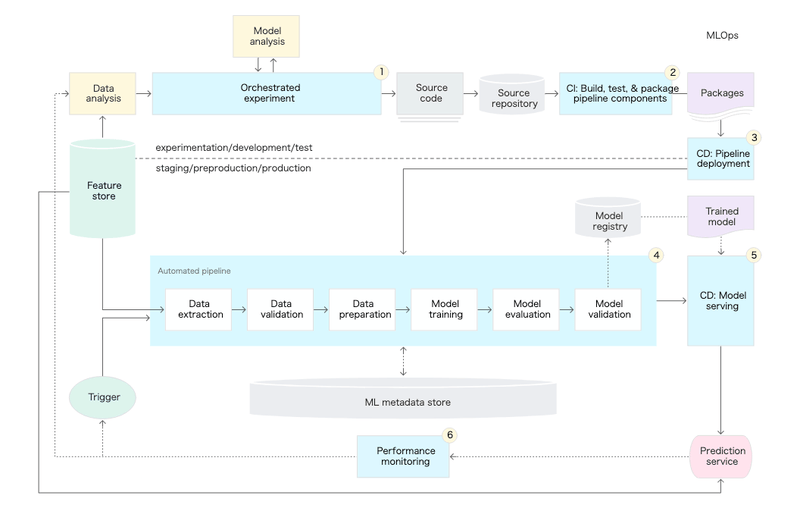
Benefits of research softwarization
I believe that the benefits of converting research to the software are not limited to increasing production efficiency. One of the advantages is the possibility of reducing human error and QRP (Questionable Research Practice) by design without human effort by reducing the room for human intervention.
For example, HARKing, hypothesis generation after observing the results of an experiment, is a typical QRP. This is a violation of the order constraint: “hypothesis” was entered after the “result” has been entered. Suppose you disallow the researcher to enter “hypothesis” after “result” with an error message. Then, you might at least be able to reduce unintentional HARKing.
Furthermore, to express in code means that you can benefit from the efficiency knowledge that hackers have built up so far. I believe this is crucial to building a more optimal knowledge-producing system.
Why we need pipelining
You can easily imagine that when general intelligence enough to conduct research is realized, it will conduct research differently than it is today. Given this, one might wonder whether it is necessary to naively put current research practices into a pipeline (of course, it is necessary for bottom-up automation).
A reason I think pipelining matters is we are far behind in the realization of the artificial researcher. Pipelining is an intermediate goal to establish guidelines for what inductive bias (constraints to add to the model) we want the artificial intelligence to have. Without this, it will be difficult to define what is essential to the act of research and how it should be abstracted/implemented. I believe that by automating specific research tasks, we better understand what research is like. This makes the roadmap to the realization of artificial researchers clearer.
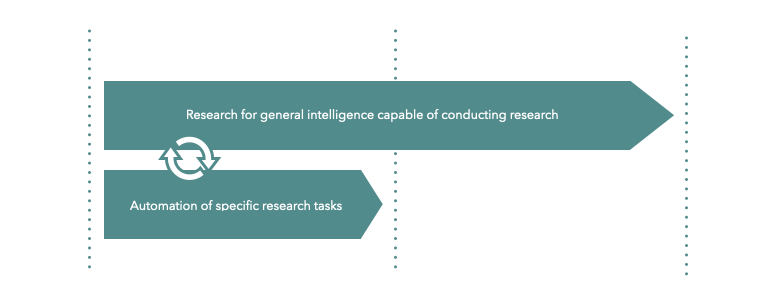
Let’s work together on research automation!
I am currently engaged in basic research aimed at “creating a general intelligence enough to do research” in the long term. However, all of the above are essential topics, and the help of many people will be indispensable in promoting this.
For example, structuring the research process needs discussions in the philosophy of science. The construction of algorithms for automation requires the help of machine learning experts. And pipeline construction would not be possible without engineers. The knowledge of those familiar with business and law is also valuable. Therefore, I would be happy if as many people as possible get interested in this project and work together to make it a reality!
I am still a newcomer, but many people are already working on research automation. I would be happy if the number of people who support and cooperate with these people, even if it is not me increases, and if this research field becomes more energetic!
Toward better research system
My ideal research system
I stated that I would like to realize a better research system. An ideal research system for me is that optimized for the production/maintenance/sharing of knowledge and that is available for those who want to do research to do so in good mental and physical health, regardless of their background or attributes. I am looking for people willing to work with me toward this goal as well! If this sounds at all interesting to you, please contact me!
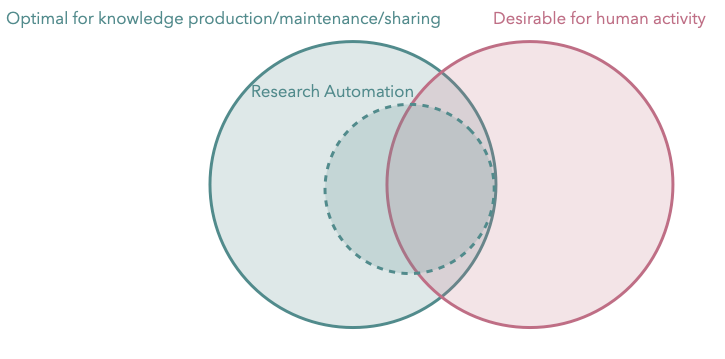
Optimization of knowledge production/maintenance/sharing
Research is a social activity involving various stakeholders. I view the activity of researchers to do research as a system that receives inputs and produces knowledge. The knowledge produced is used to produce the next piece of knowledge, so it flows recursively into the same system. Therefore, I believe that the optimization of research means improving the following quantitatively and qualitatively: 1. inputs to the system, 2. the system itself, and 3. output from the system.
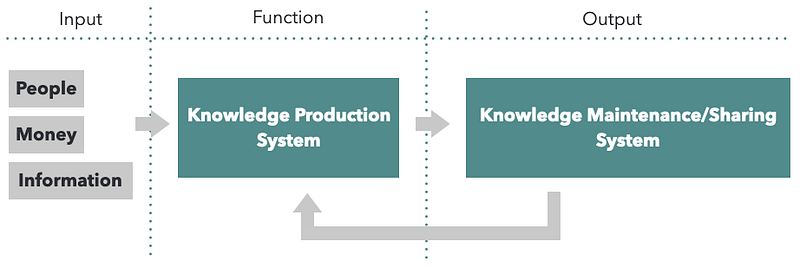
Inputs to a knowledge production system are categorized into “people,” “money,” and “information (good).” In terms of “money,” we should consider how to increase the inflow of funds from more diverse channels. For “people,” you should increase the inflow of knowledge-producing and supporting ones while reducing the outflow.
Considering output from the knowledge production system is to consider maximizing the utilization of the produced knowledge. Since both topics of inputs and output are critical, I would like to write another article on them in the future.
Optimization of a multi-layered knowledge production system
I believe that the knowledge production system consists of multiple layers, such as individuals, laboratories, research institutions, and research ecosystems. My focus on research automation, which I explained above, referred to the automation of the research process at the individual level. Also, I was discussing those parts of the process directly involved in research. However, to optimize knowledge production, it matters to optimize hierarchies other than the individual level and to automate tasks that are not directly involved in research.
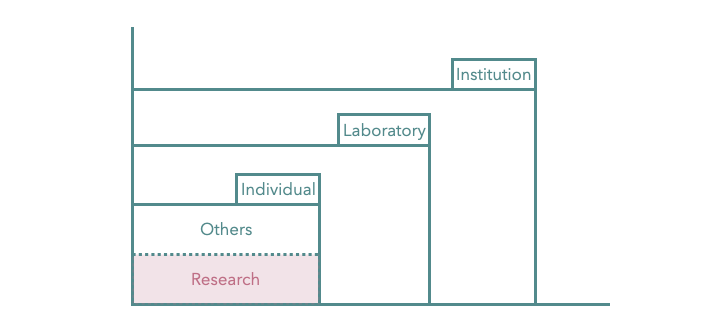
For example, on a laboratory basis, university laboratories have laboratory management tasks such as research guidance, funding acquisition, and research project management. The issue is to optimize these, especially to make them de-personalized and shared knowledge.
A university PI (laboratory boss) becomes a PI based on their research performance. Nevertheless, once they become a PI, they should provide education, research guidance, management, administration, and university office work. It is easy to imagine that this can cause a skill mismatch.
Optimization of the activity of not research
Next, let’s talk about automating tasks that are not directly related to research. According to a 2018 survey on the breakdown of university faculty activity time in Japan, it is reported that university faculty spend about 30% to 50% of their time actually devoted to research work. The remaining 50–70% is occupied by tasks such as teaching, various administrative procedures, and writing budget applications. Given the goal of optimizing knowledge production systems, the impact of automating these non-research tasks will be large.
Since this is the automation of tasks that are not necessarily unique to research, you can more directly benefit from DX knowledge in other industries. In this sense, if as many people on the business side who have this knowledge could cooperate with us, we may be able to make great progress in improving research efficiency.
Results of a survey by Rahenau Instituut on the research time of Dutch researchers also indicate that researchers devote much of their time to activities outside of research.
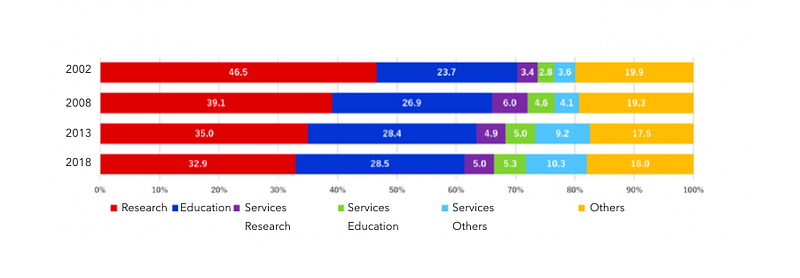
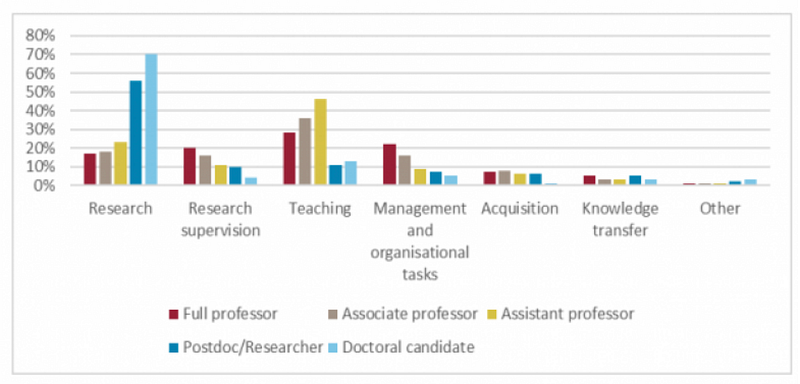
Let's work together on research optimization!
I cannot personally advance against all of these, as it matters to focus on the problem to commit to for promoting projects. However, these are all inevitable issues, and we should solve them as quickly as possible. Therefore, I would like to help those working in these fields. I hope we can all work together to build a more optimal research system!
A research environment in which those who wish to conduct research can do so in a physically and mentally healthy manner, regardless of their background or attributes
I believe the research environment should be favorable for people to spend time. Specifically, I think a research environment should be where anyone can conduct research in good health mentally and physically, regardless of their backgrounds or attributes.
I have basically written what I want to tell you about this in another article, so I will not write much about it this time. If you are aware of similar issues, I would be happy if we could discuss about this issue.

I believe it is important to expand the research community outside of the existing research ecosystem to alleviate this problem in the long term. So I am working to advance that by adopting a systems-oriented solution approach.
On the other hand, it is also true that this does not provide a prescription for the issue at hand. Also, I believe it is equally important to solve these issues through a political approach. Therefore, I sincerely support those struggling in these areas. I would be happy to help them as far as I can.
Otherwise, if you have experienced something painful or unacceptable in your research, please do not hesitate to contact me. It may not be an immediate solution to your problem, but I believe I can help in some way. I hope to reduce the number of people who like research but have come to dislike it or have had to leave the research community. I hope we can all work together to expand a more comfortable research environment!
I’m looking for a fellow working on a new style of research!
I’ll help those interested in becoming independent researchers!
As I mentioned above, I believe it will be positive for the entire research ecosystem in the long run if the research field flourishes outside of the current research ecosystem. This is one of the reasons I am doing independent research. So I hope that more researchers will become independent or do research in a new style. If you are interested in being an independent researcher or want to try various research styles, I would be happy to help you. Please contact me by all means!
My specialty is machine learning, so I have been able to do my research individually with little hindrance. Also, I have been blessed with wonderful friends giving me a job. So my methods may not be very reproducible. However, I may be able to share what I know in my own way, or I may be able to introduce you to a job if the conditions are right for you. Many people have been doing research on their own for a long time. Even if I can’t do something directly, I may be able to introduce information about how they are living their lives.
I think some people want to do your research yourself. Some might have had a hard time in the current lab. Others may be temporarily freelancing until they get their next position. If any of those people are interested, feel free to contact me!
I’m looking for people to try different research methods with!
As I have written in other articles, I would like to manage the entire research process on GitHub. Besides that, there are many other things I would like to do. For example, I would like to conduct research with a full-fledged project manager, or create a DAO to conduct research. I would like to explore various research styles by running a hypothesis testing cycle.
I’m going to do these even on my own. But I think it is more fun to work together so that we can come up with new ideas and try out ideas that I cannot do alone. So I am also looking for researchers interested in trying out new research methods together! I believe the next generation of research will emerge from this kind of bottom-up trial-and-error process. Let’s all try different ways of doing research!
Some people are interested in this kind of thing but cannot do it due to restrictions in their position or research field. In such cases, I would be happy to just hear your ideas. As a person free to do various things at my discretion, I would like to try out the ideas for those people!
Conclusion
I have written this article hoping that as many people as possible will be interested in research automation and better research system. I would be happy if some of you join me to pursue these goals.
I have already expanded the scope of this article considerably. Before I end this article, let me expand it just a little bit more.
My ultimate goals
I’m interested in how much of the unknown of this world can be made known. In other words, I am interested in and aim for a world in which we can make as much of this world’s unknowns known as quickly as possible.
To that end, I believe it is necessary to 1. improve knowledge production, 2. update the human ability to comprehend, and 3. aim for the perpetuation of humans by transplanting them into machines. 1 is the part I have described so far. I intend to contribute to the realization of the above world by committing myself to this.
The autonomous artificial researcher I want to aim for in 1 is the kind of being that will overcome humanity. Thus, I hope that 2 and 3 will progress so that even after their emergence, humans can still enjoy understanding knowledge. So, I wholeheartedly support anyone working on 2 or 3! If there’s anything I can do for you, please feel free to contact me anytime!

I understand that any goal is the result of steady daily work and the accumulation of concrete results. I still have a long way to go to reach my goal, but I would like to keep being down-to-earth and solve specific issues one by one, starting from where I can.
Appendix
Many efforts have already been made regarding the automation/optimization of research. Only a few of them are presented here for your reference. I also include what I believe is relevant. I have not been able to cover all of them, but I hope to do a more comprehensive summary at some point.
Understanding research
Philosophy of science: This is a branch of philosophy that covers science. It is not directly related to automation, but I believe it provides a useful perspective for formalizing research. Since I am not a specialist, I often study by the Stanford Encyclopedia of Philosophy, which fits beginners (Scientific Method, Confirmation, Scientific Discovery, etc.).
Science of Science: This is the field of scientific analysis of a wide range of topics related to research, such as networks of scientists, citation dynamics, and the careers of scientists based on data. Dr. Barabasi of Network Science, who also wrote the book The Science of Science, is well known in this field.
Science, technology and society: I understand that this is a field that studies science as a social activity. It deals with a wide range of issues from social scientific analysis of the impact of society on science to the ethics of scientists.
Research automation
Laboratory automation: This is a general term for automation of research-related activities such as experiments, analysis, and research life. For example, Dr. HamediRad and his colleagues successfully learned the ML model to make a single-arm robot search autonomously for combinations of microbial gene sequences.
AI for Science: This is a study that uses machine learning to replace processes in science. This seems to be one of the most exciting research areas these days. As mentioned above, some studies use Bayesian optimization to search for experimental conditions, deep neural networks to predict protein structure, parameter estimation for theoretical models, etc. I have the impression that DeepMind, famous for AlphaGo, is trying to advance this on a large scale. Like DeepMind, I believe that attention is being paid to how machine learning can be used for scientific discovery.
Automated theorem proving: It is an attempt to automate mathematical proofs by computer. In particular, methods that combine conventional automatic proofs of theorems with machine learning have emerged in recent years. Czech researcher Dr. Josef Urban and his colleagues have led the field from the early stages. In recent years researchers from Google and other companies have entered the field. The AITP international conference is small but gathers the latest research in this research field.
Solving/Discovering equations by neural networks: It is an attempt to make the current neural network solve and discover equations. I am not familiar with it, but AI Feynman is one of the names I have heard.
AutoML: Machine learning automation. It includes the automation of hyperparameter exploration and neural network architecture exploration. Companies seem to be making great progress. In research, I have the impression that Dr. Frank Hutter and his colleagues are leading the research area.
Automation for paper survey and writing: This is a research project that focuses on the extraction of information from papers, the acquisition of relevant research, summarization, and writing. I feel that COVID-19 has increased the need for automated acquisition of information from papers. I have seen a lot of COVID-related research emerge. I have the impression that AllenNLP has been doing a great job recently in this area of applying AI.